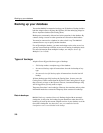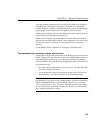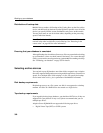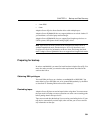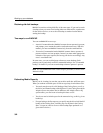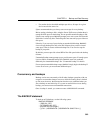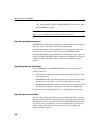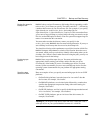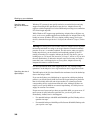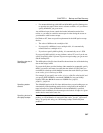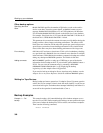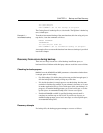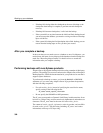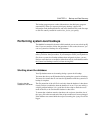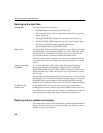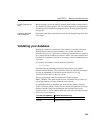
Backing up your database
386
Specifying tape
devices on Windows
NT
Windows NT systems do not specify rewind or no rewind devices and only
support fixed-length I/O operations to tape devices. Adaptive Server IQ
requires variable-length devices. It does additional processing to accommodate
NT’s fixed-length tape I/O.
While Windows NT supports tape partitioning, Adaptive Server IQ does not
use it, so do not use another application to format tapes for Adaptive Server IQ
backup or restore. Windows NT has a simpler naming strategy for its tape
devices, where the first tape device is ’\\.\tape0’, the second is ’\\.\tape1’, a n d so
on.
Warning! For backup (and for most other situations) Adaptive Server IQ treats
the leading backslash in a string as an escape character, when the backslash
precedes an n, an x, or another backslash. For this reason, when you specify
backup tape devices you must double each backslash required by the NT
naming convention. For example, indicate the first NT tape device you are
backing up to as ’\\\\.\\tape0’, the second as ’\\\\.\\tape1’, and so on. If you omit
the extra backslashes, or otherwise misspell a tape device name, and write a
name that is not a valid tape device on your system, Adaptive Server IQ
interprets this name as a disk file name.
For more information about fixed-length I/O on NT, see “Tuning backup
operations” in the Adaptive Server IQ Installation and Configuration Guide.
Specifying the size of
tape backups
The SIZE option of the TO clause identifies the maximum size of the backed up
data on that stripe, in KB.
If you use the Sybase–provided backup (as opposed to a third party backup
product), you should specify
SIZE for unattended tape backups on platforms
that do not reliably detect the end-of-tape marker. No volume used on the
corresponding device can be shorter than this value. Although IQ does not
require you to specify
SIZE for an attended tape backup, it is always best to
supply an accurate size estimate.
If tapes run out of space and you have not specified
SIZE, you get an error. If
tapes run out of space before the specified size, you do not get an error
immediately; instead, here is what happens:
• For attended backups with
SIZE and STACKER specified, Backup tries to
open the next tape.
• For attended backups with
SIZE specified but not STACKER, Backup asks
you to put in a new tape.



